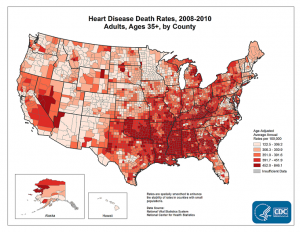Heart disease is the leading cause of death for both men and women. More than half of the deaths due to heart disease in 2009 were in men.About 610,000 Americans die from heart disease each year—that’s 1 in every 4 deaths.[1]
Heart Disease in the United States
- Heart disease is the leading cause of death for both men and women. More than half of the deaths due to heart disease in 2009 were in men.
- Coronary heart disease (CHD) is the most common type of heart disease, killing over 370,000 people annually.
- Every year about 735,000 Americans have a heart attack. Of these, 525,000 are a first heart attack and 210,000 happen in people who have already had a heart attack. [2]
Heart Disease Deaths Vary by Race and Ethnicity
Heart disease is the leading cause of death for people of most ethnicities in the United States, including African Americans, Hispanics, and whites. For American Indians or Alaska Natives and Asians or Pacific Islanders, heart disease is second only to cancer. [2]
| Race of Ethnic Group | % of Deaths |
|---|---|
| American Indians or Alaska Natives | 18.4 |
| Asians or Pacific Islanders | 22.2 |
| Non-Hispanic Blacks | 23.8 |
| Non-Hispanic Whites | 23.8 |
| All | 23.5 |
Heart Disease Deaths Vary by Geography
During 2008-2010, death rates due to heart disease were highest in the South and lowest in the West. Below is a map showing the prevalence of heart disease across the United States. [2]

Sources:
1. http://www.cdc.gov/dhdsp/data_statistics/fact_sheets/fs_heart_disease.htm
2. http://www.cdc.gov/heartdisease/facts.htm
Latest news for Heart disease
Heart disease and stroke risk dictated by profession in older workers, says new report
Heart disease and stroke risk is dictated by profession in older workers, according to new findings…Continue Reading
Heart disease risk in women increases with high blood pressure, highly active jobs: Study
Heart disease risk in women who have hypertension and work at physically demanding jobs has been found to be quite high…Continue Reading
Heart disease risk higher with long hours spent at the office
Researchers analyzed over 1,900 individuals and found that 43 percent had been diagnosed with a cardiovascular-related problem…Continue Reading
Heart disease, cancer risk higher when working in rotating night shifts, study
Heart disease, cancer risk higherHeart disease and cancer risk is higher when working in rotating night shifts, the research has found…Continue Reading
Heart disease patients benefit from tai chi
Heart disease patients benefit from tai chiHeart disease patients benefit from performing tai chi exercises as reported by a new study…Continue Reading
Related Heart disease articles
Natural ways to improve heart rate and get your heart pumping
In order to improve heart rate it is necessary to get the heart pumping which in turn will lead to better heart health…Continue Reading
The heart attack symptom you might not know about
Chest pain, difficulty breathing, discomfort, nausea, and unusual tiredness are all common heart attack symptoms you are probably aware of…Continue Reading
If you’re on heart medication, you need to know this…
Many of us are still too shy to talk to our doctors about our sexual health, no matter how old we are…Continue Reading
Heart palpitations after eating and when lying down
Heart palpitations can occur after eating or when lying down. A normal heat beat is between 60 to 100 beats per minute but heart palpitations can lower or increase this number…Continue Reading
What your heart rate is really telling you…
If you’ve ever listened to anybody’s heartbeat (including your own), it probably sounded similar to “lub-dub, lub-dub.” A heartbeat – or heart rate – signals life and is a strong indication of health as well…Continue Reading